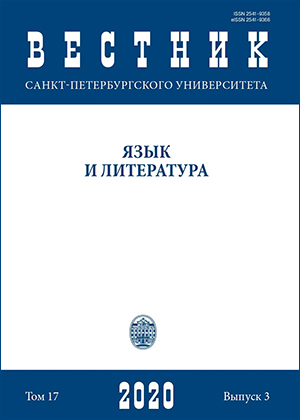The role of the internet in the proliferation of new acronyms in the Russian language
DOI:
https://doi.org/10.21638/spbu09.2020.301Abstract
This paper focuses on a special form of English borrowing: the use of acronyms with phraseological meaning. The Russian computer language, more precisely the Russian computer slang, is unthinkable without the influence of English. This influence is manifested at various language levels and in a variety of forms (borrowings, calques and half-calques, univerbats, reverse derivatives, alphabetic and alphanumeric abbreviations, “distorted forms” of both full names and acronyms). Based on the English abbreviations, first the meaning of the respective full form is explained in English and then its fate is illustrated in the Russian host language. Comparison with German, which also borrowed a large number of such abbreviations, shows similarities and differences in the processing of these phraseological units. The term “digital communication” here refers not only to communication on the Internet in a narrower sense (chats, forums, e-mail, etc.), but also to such channels as SMS, Twitter, WhatsApp, and others. The Internet plays a double role in the development of the modern Russian language: firstly, as a means of mass communication that provides an opportunity to popularize new linguistic phenomena in the shortest possible time and with maximum range, and secondly, as a generator of new linguistic forms that would be impossible without the Internet itself. One part of these neologisms refers to the technical features of digital communication and the tools necessary for it, while the other part refers to the implementation of a new communicative style that is clearly different from analogue communication in its oral and written forms.
Keywords:
phraseological borrowing, phraseological neologism, abbreviation, acronym, computer slang
Downloads
References
Баско 2018 — Баско Н. В. Фразеологические неологизмы в русском языке: семантика, этимология, функционирование. Филологические науки. Вопросы теории и практики. 2018, №3–1 (81): 64–66.
Бузарова, Сасина 2006 — Бузарова Е. А., Сасина С. А. Метафоризация профессиональных фразеологизмов как особый случай вторичной номинации (на примерах английского и русского языков). Вестник Адыгейского гос. ун-та. 2006, №3: 176–178.
Виноградова 2001 — Виноградова Н. В. Компьютерный сленг и литературный язык: проблемы конкуренции. Исследования по славянским языкам. 2001, № 6: 203–216.
Ганапольская 2010 — Ганапольская Е. В. Неология во фразеологии. Научно-технические ведомости С.-Петерб. гос. политех. ун-та. Гуманитарные и общественные науки. 2010, №111: 183–189.
Ганапольская 2011 — Ганапольская Е. В. Семантические изменения в современной русской фразеологии. Научно-технические ведомости С.-Петерб. гос. политех. ун-та. Гуманитарные и общественные науки. 2011, 4: 204–211.
Жуков 1991 — Жуков В. П. Формоизменение фразеологизмов русского языка. Русистика. 1991, № 2: 36–40.
Леонтьев 2006 — Леонтьев В. П. Интернет. Карманный справочник. М.: Олма-Пресс, 2006. 864 с.
Малински 1992 — Малински Т. Возникновение новых фразеологических единиц. Русистика. 1992, № 2: 67–76.
Тюрина 2005 — Тюрина С. Ю. О языке и юморе «программеров». Лингвистический аспект компьютерного сленга. Вестник Ивановского гос. энергетич. ун-та. 2005, Выпуск 4. URL: http://ispu.ru/files/16-20.pdf (дата обращения: 22.01.2020).
Селиванова 2015 — Селиванова Е. А. Компьютерный сленг: псевдозаимствование как способ номинации. Науковий вiсник Дрогобицького державного педагогічного університету ім. I. Франка. Серiя Фiлологiчнi науки. Мовознавство. 2015, № 4: 6–11.
Шепель 2013 — Шепель Ю. А. Снова о компьютерном сленге. Лінгвістичний вісник: зб. наук. пр. 2013, Вип. 1: 58–64.
C U L8r, или Английский в Интернете. URL: https://www.yescenter.ru/blog/articles/yazykovye-interesnosti/english_in_internet/ (дата обращения: 28.02.2020).
Narloch 2006 — Narloch A. Особенности образования компьютерного жаргона в русском и польском языках. UWM Olsztyn. Acta Neophilologica. 2006, VIII: 91–99.
Баско 2018 — Basko N.V. Phraseological Neologisms in the Russian Language: Semantics, Etymology, Functioning. Filologicheskie nauki. Voprosy teorii i praktiki. 2018, №3–1 (81): 64–66. (In Russian)
Бузарова, Сасина 2006 — Buzarova Е. А., Sasina Sv. А. Metaphorization of Professional Phraseologisms as a Special Case of Secondary Nomination (Based on the English and the Russian Languages). Vestnik Adygeiskogo gos. un-ta. 2006, №3: 176–178. (In Russian)
Виноградова 2001 — Vinogradova N. V. On the Rivalry between Computer Slang and Literary Language. Issledovaniia po slavianskim iazykam. 2001, № 6: 203–216. (In Russian)
Ганапольская 2010 — Ganapol’skaja E. V. Neologisms in Phraseology. Nauchno-tehnicheskie vedomosti S.-Peterb. gos. politekh. un-ta. Gumanitarnye i obshchestvennye nauki. 2010, № 111: 183–189. (In Russian)
Ганапольская 2011 — Ganapol'skaja E. V. Semantic Changes in Modern Russian Phraseology. Nauchno-tehnicheskie vedomosti S.-Peterb. gos. politeh. un-ta. Gumanitarnye i obshchestvennye nauki. 2011, 4: 204–211. (In Russian)
Жуков 1991 — Zhukov V. P. Formal Changes in Russian Phraseologisms. Rusistika. 1991, № 2: 36–40. (In Russian)
Кронгауз, Литвин, Мерзлякова 2018 — Krongauz M. A., Litvin E. A., Merzljakova V. N. Dictionary of the Internet.ru Language. Кронгауз М. А. (ed.). Мoscow: Slovari XXI veka Publ., 2018. 288 p. (In Russian)
Леонтьев 2006 — Leont'ev V. P. Internet. A Pocket Dictionary. Мoscow: Olma-Press Publ., 2006. 864 p. (In Russian)
Малински 1992 — Malinski Т. On the Emergence of New Phraseological Units. Rusistika. 1992, № 2: 67–76. (In Russian)
Тюрина 2005 — Tiurina S. Iu. On the language and humor of "programmers." Linguistic aspect of computer slang. Vestnik Ivanovskogo gos. e`nergetich. un-ta. 2005, Issue 4. URL: http://ispu.ru/files/16-20.pdf (Access date: 22.01.2020).
Селиванова 2015 — Selivanova Е. А. Computer Slang: Pseudo-Borrowings as a Means of Nomination. Naukovii visnik Drogobicz`kogo derzhavnogo pedagogіchnogo unіversitetu im. I. Franka. Seriia Filologichni nauki. Movoznavstvo. 2015, № 4: 6–11. (In Russian)
Шепель 2013 — Shepel' Ju. A. Once Again on Computer Slang. Lіngvіstichnii vіsnik: zb. nauk. pr. 2013, Issue1: 58–64. (In Russian)
Narloch 2006 — Narloch A. Characteristics of the Formation of Computer Slang in the Russian and the Polish Languages. UWM Olsztyn. Acta Neophilologica. 2006, VIII: 91–99. (In Russian)
Downloads
Published
How to Cite
Issue
Section
License
Articles of "Vestnik of Saint Petersburg University. Language and Literature" are open access distributed under the terms of the License Agreement with Saint Petersburg State University, which permits to the authors unrestricted distribution and self-archiving free of charge.






